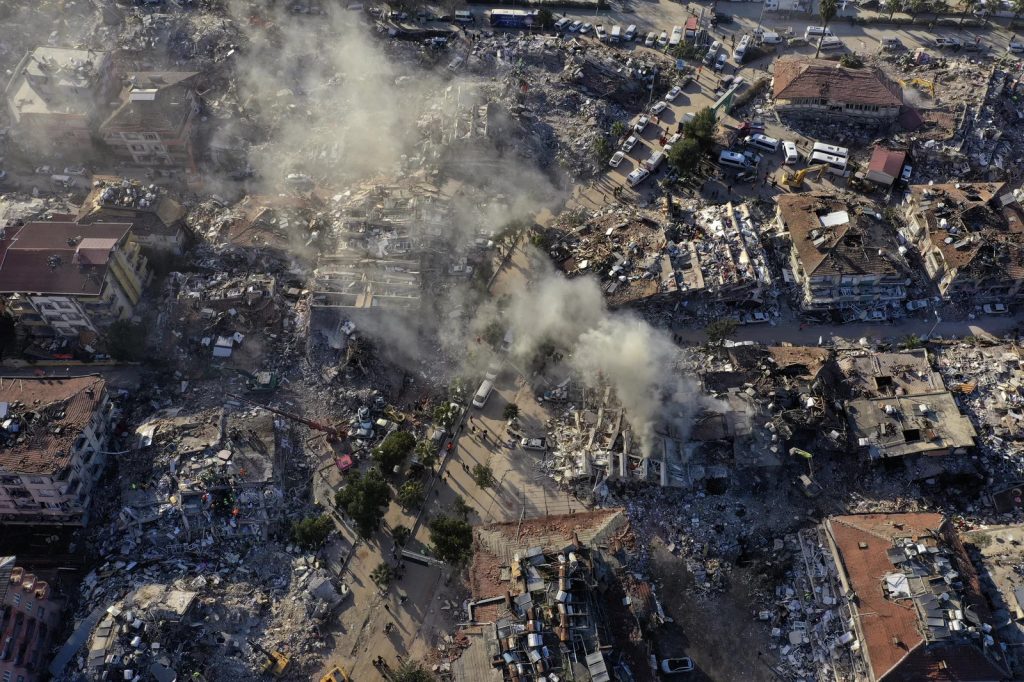Five days after two powerful earthquakes shook southern Turkey in the country’s worst natural disaster in a generation, the death toll has surpassed 21,000, a staggering number in just five days, and one expected to grow.

Five days after two powerful earthquakes shook southern Turkey in the country’s worst natural disaster in a generation, the death toll has surpassed 21,000, a staggering number in just five days, and one expected to grow.
Almost 3,000 buildings had collapsed in seven different provinces in Turkey including public hospitals. A famous mosque dating back to the 13th century partially collapsed in the province of Maltaya, where a 14-story building with 28 apartments that housed 92 people collapsed.
The World Bank will provide $1.78bn (£1.47bn) to Turkey. Meanwhile, the US will send $85m in aid for Turkey and Syria. Immediate assistance of $780m would be offered via contingent emergency response components from two existing projects in Turkey, the bank said. Countries including France and Germany have also sent money and support, as has Greece, which has had long-term disputes with Turkey.
At least 28,044 people have been evacuated from Kahramanmaraş, one of the southern Turkish provinces hardest hit by Monday’s earthquake, including 23,437 by air and 4,607 by road and rail, Turkey’s disaster management agency said.
Turkish President Recep Tayyip Erdogan has announced a three-month state of emergency in 10 provinces worst-affected by an earthquake.
Rescuers continued to pull people who have been trapped for days out of the rubble, including a young girl trapped for three days.
Failing rescue efforts
Many Turks vented their anger online over what they said was a negligent emergency response in the southern-most province of Hatay, with many complaining that rescue efforts had failed to reach the area.
In Hatay, the quake levelled multiple government buildings including the local chapter of Turkey’s disaster relief agency, the AFAD.
“I am so angry,” said analyst Gönül Tol, of the Middle East Institute in Washington. “People are trying to dig out loved ones trapped under rubble. It is cold, raining, no electricity. One family member is trapped under a heavy concrete slab, waiting for rescue workers for hours.”
Mass graves
“I’ve lost count of the bodies we’ve buried since Monday,” a disaster victim Sadık Güneş says. “We built an extension to the cemetery. There are still people under the debris. We will bury those ones too once they are recovered. We are burying the bodies even late at night with the help of citizens who come to help us.”
While awaiting the arrival of forensic doctors and prosecutors, the inhabitants of some cities in Turkey have piled bodies in stadiums or in car parks in order to give relatives an opportunity to quickly identify their loved ones before being issued a death certificate.
The freshly dug graves are marked with blank headstones, with only pieces of ripped cloth gathered from the victims’ clothing to identify them.
In the Afrin district in north-east Syria, a cemetery has been extended with makeshift mass grave burial sites. In the southern Turkish city of Osmaniye, a cemetery ran out of space, while outside Kahramanmaras, near the epicentre of the quake, a makeshift graveyard overflowed with so many dead bodies.
International aid
The World Health Organisation said up to 23 million people overall could be affected by the earthquake and promised long-term assistance. Adhanom Ghebreyesus said 77 national and 13 international emergency medical teams were deploying to the affected areas.
The UN’s cultural body, Unesco, warned that two sites on its World Heritage list had sustained damage and that several others may also have been hit. The buildings are the old city of Aleppo, Syria, and the fortress in the south-eastern Turkish city of Diyarbakir.
Turkey is discussing reopening a border crossing into Syrian government territory, a Turkish official said on Friday, enabling earthquake aid to be sent directly to areas controlled by the Syrian president, Bashar al-Assad, after a decade of enmity.
The World Food Programme (WFP) says it is running out of stocks in north-west Syria and has called for the opening of more border crossings from Turkey after both countries were ravaged by earthquakes.

